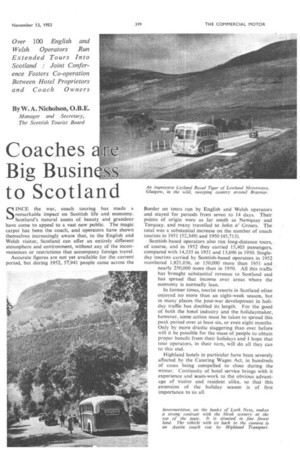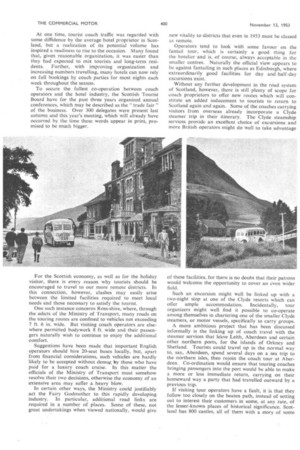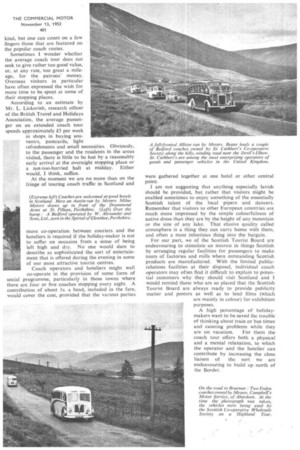Coaches Big Busin to Scotland
Page 111

Page 112

Page 113

If you've noticed an error in this article please click here to report it so we can fix it.
By W. A. Nicholson, O.B.E.
Manager and Secretary, The Scottish Tourist Board SINCE the war, coach touring has made a remarkable impact on Scottish life and economy. Scotland's natural assets of beauty and grandeur have come to appeal to a vast new public. The magic carpet has been the coach, and operators have shown themselves increasingly aware that, to the English and Welsh visitor, Scotland can offer an entirely different atmosphere and environment, without any of the inconveniences or restrictions that accompany foreign travel.
Accurate figures are not yet available for the current period, but during 1952, 57,941 people came across the Border on tours run by English and Welsh operators and stayed for periods from seven to 14 days. Their points of origin were as far south as Newquay and Torquay, and many travelled to John o' Groats. The total was a substantial increase on the number of coach tourists in 1951 (52,349) and 1950 (45,713).
Scottish-based operators also run long-distance tours, of course, and in 1952 they carried 15,403 passengers, compared with 14,335 in 1951 and 13,696 in 1950. Singleday tourists carried by Scottish-based operators in 1952 numbered 1,821,036, or 150,000 more than 1951 and nearly 250,000 more than in 1950. All this traffic has brought substantial revenue to Scotland and has spread that income over areas where the economy is normally lean.
In former times, tourist resorts in Scotland often enjoyed no more than an eight-week season, but in many places the post-war development in holiday traffic has doubled its length. For the good of both the hotel industry and the holidaymaker, however, some action must be taken to spread this peak period over at least six, or even eight months. Only by more drastic staggering than ever before will it be possible for the mass of people to obtain proper benefit from their holidays and I hope that tour operators, in their turn, will do all they can to this end.
Highland hotels in particular have been severely affected by the Catering Wages Act, in hundreds of cases being compelled to close during the winter. Continuity of hotel service brings with it experience and team-work to the obvious advantage of visitor and resident alike, so that this extension of the holiday season is of first importance to us all. At one time, tourist coach traffic was regarded with some diffidence by the average hotel proprietor in Scotland, but a realization of its potential volume has inspired a readiness to rise to the occasion. Many found that, given reasonable organization, it was easier than they had expected to mix tourists and long-term residents. Further, with improving organization and increasing numbers travelling, many hotels can now rely on full bookings by coach parties for most nights each week throughout the season.
To secure the fullest co-operation between coach operators and the hotel industry, the Scottish Tourist Board have for the past three years organized annual conferences, which may be described as the" trade fair" of the business. Over 300 delegates were present last autumn and this year's meeting, which will already have occurred by the time these words appear in print, promised to be much bigger.
For the Scottish economy, as well as for the holiday visitor, there is every reason why tourists should be encouraged to travel to our more remote districts. In this connection, however, clashes may easily arise between the limited facilities required to meet local needs and those necessary to satisfy the tourist.
One such instance concerns Ross-shire, where, through the edicts of the Ministry of Transport, many roads on the touring routes are confined to vehicles not exceeding 7 ft. 6 in. wide. But visiting coach operators are elsewhere permitted bodywork 8 ft. wide and their passengers naturally wish to continue to enjoy the additional comfort.
Suggestions have been made that important English operators should hire 20-seat buses locally, but, apart from financial considerations, such vehicles are hardly likely to be accepted without demu,r1toy those who have paid for a luxury coach cruise. In this matter the officials of the Ministry of Transport must somehow resolve their two decisions, otherwise the economy of an extensive area may suffer a heavy blow.
In certain other ways, the Ministry could justifiably act the Fairy Godmother to this rapidly developing industry. In particular, additional road links are required in a number of places. Some of these, not great undertakings when viewed nationally, would give new vitality to districts that even in 1953 must be classed as remote.
Operators tend to look with some favour on the fantail tour, which is certainly a good thing for the hotelier and is, of course, always acceptable in the smaller centres. Naturally the official view appears to be against fantailing in such places as Edinburgh, where extraordinarily good facilities for day and half-day excursions exist.
Without any further development in the road system of Scotland, however, there is still plenty of scope for coach proprietors to offer new routes which will constitute an added inducement to tourists to return to Scotland again and again. Some of the coaches carrying visitors from overseas already incorporate a Clyde steamer trip in their itinerary. The Clyde steamship services provide an excellent choice of excursions and more British operators might do well to take advantage of these facilities, for there is no doubt that their patrons would welcome the opportunity to cover an even wider field.
Such an excursion might well be linked up with a two-night stop at one of the Clyde resorts which can offer ample accommodation. Incidentally, tour organizers might well find it possible to co-operate among themselves in chartering one of the smaller Clyde steamers, or motor vessels, specifically to carry groups.
A more ambitious project that has been discussed informally is the linking up of coach travel with the steamer services that leave Leith, Aberdeen and certain other northern ports, for the islands of Orkney and Shetland. Tourists could travel up in the normal way to, say, Aberdeen, spend several days on a sea trip to the northern isles, then rejoin the coach tour at Aberdeen. Co-ordination would ensure that touring coaches bringing passengers into the port would be able to make a more or less immediate return, carrying on their homeward way a party that had travelled outward by a previous trip.
If visiting tour operators have a fault, it is that they follow too closely on the beaten path, instead of setting out to interest their customers in some, at any rate, of the lesser-known places of historical significance. Scotland has 800 castles, all of them with a story of some kind, but one can count on a few fingers those that are featured on the popular coach routes.
Sometimes I wonder whether the average coach tour does not seek to give rather too good value, or, at any rate, too great a mileage, for the patrons' money. Overseas visitors in particular have often expressed the wish for more time to be spent at some of their stopping places.
According to an estimate by Mr. L. Lickorish, research officer of the British Travel and Holidays Association, the average passenger on an extended coach tour spends approximately £5 per week in shops in buying sou venirs, postcards, light refreshments and small necessities. Obviously, to the passenger and the residents in the areas visited, there is little to be lost by a reasonably early arrival at the overnight stopping place or a not-too-hurried halt at midday. Either would, I think, suffice.
At the moment we are no more than on the fringe of touring coach traffic in Scotland and more co-operation between couriers and the hoteliers is required if the holiday-maker is not to suffer on occasion from a sense of being left high and dry. No one would dare to describe as sophisticated the sort of entertainment that is offered during the evening in some of our most attractive tourist centres.
Coach operators and hoteliers might well co-operate in the provision of some form of social programme, particularly in those towns where there are four or five coaches stopping every night. A contribution of about Is. a head, included in the fare, would cover the cost, provided that the various parties were gathered together at one hotel or other central point.
I am not suggesting that anything especially lavish should be provided, but rather that visitors might be enabled sometimes to enjoy something of the essentially Scottish talent of the local pipers and dancers. Remember that visitors to other European countries are much more impressed by the simple colourfulness of native dress than they are by the height of any mountain or the size of any lake. That elusive quality called atmosphere is a thing they can carry home with them, and often a most infectious thing into the bargain.
For our part, we of the Scottish Tourist Board are endeavouring to stimulate an interest in things Scottish by arranging regular facilities for passengers to make tours of factories and mills where outstanding Scottish products are manufactured. With the limited publicrelations facilities at their disposal, individual coach operators may often find it difficult to explain to potential customers why they should visit Scotland and I would remind those who are so placed that the Scottish Tourist Board are always ready to provide publicity matter and posters as well as to lend films (which are mainly in colour) for exhibition purposes.
A high percentage of holidaymakers want to be saved the trouble of thinking about train or bus times and catering problems while they are on vacation. For them the coach tour offers both a physical and a mental relaxation, to which the operator and the hotelier can contribute by increasing the close liaison of the sort we are endeavouring to build up north of the Border.












































































































































































































































